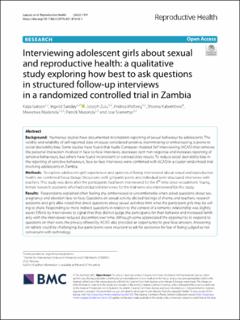| dc.contributor.author | Isaksen, Katja | |
| dc.contributor.author | Sandøy, Ingvild Fossgard | |
| dc.contributor.author | Zulu, Joseph | |
| dc.contributor.author | Melberg, Andrea | |
| dc.contributor.author | Kabombwe, Sheena | |
| dc.contributor.author | Mudenda, Mweetwa | |
| dc.contributor.author | Musonda, Patrick | |
| dc.contributor.author | Svanemyr, Joar | |
| dc.date.accessioned | 2022-12-28T11:52:07Z | |
| dc.date.available | 2022-12-28T11:52:07Z | |
| dc.date.created | 2022-05-11T13:32:00Z | |
| dc.date.issued | 2022 | |
| dc.identifier.issn | 1742-4755 | |
| dc.identifier.uri | https://hdl.handle.net/11250/3039632 | |
| dc.description.abstract | Background
Numerous studies have documented inconsistent reporting of sexual behaviour by adolescents. The validity and reliability of self-reported data on issues considered sensitive, incriminating or embarrassing, is prone to social-desirability bias. Some studies have found that Audio Computer-Assisted Self Interviewing (ACASI) that removes the personal interaction involved in face-to-face interviews, decreases item non-response and increases reporting of sensitive behaviours, but others have found inconsistent or contradictory results. To reduce social desirability bias in the reporting of sensitive behaviours, face-to-face interviews were combined with ACASI in a cluster randomized trial involving adolescents in Zambia.
Methods
To explore adolescent girls’ experiences and opinions of being interviewed about sexual and reproductive health, we combined Focus Group Discussions with girl participants and individual semi-structured interviews with teachers. This study was done after the participants had been interviewed for the 6th time since recruitment. Young, female research assistants who had conducted interviews for the trial were also interviewed for this study.
Results
Respondents explained often feeling shy, embarrassed or uncomfortable when asked questions about sex, pregnancy and abortion face-to-face. Questions on sexual activity elicited feelings of shame, and teachers, research assistants and girls alike noted that direct questions about sexual activities limit what the participant girls may be willing to share. Responding to more indirect questions in relation to the context of a romantic relationship was slightly easier. Efforts by interviewers to signal that they did not judge the participants for their behavior and increased familiarity with the interviewer reduced discomfort over time. Although some appreciated the opportunity to respond to questions on their own, the privacy offered by ACASI also provided an opportunity to give false answers. Answering on tablets could be challenging, but participants were reluctant to ask for assistance for fear of being judged as not conversant with technology.
Conclusion
Strategies to avoid using overly direct language and descriptive words, asking questions within the context of a romantic relationship and a focus on establishing familiarity and trust can reduce reporting bias. For the use of ACASI, considerations must be given to the context and characteristics of the study population. | en_US |
| dc.language.iso | eng | en_US |
| dc.publisher | BMC | en_US |
| dc.rights | Navngivelse 4.0 Internasjonal | * |
| dc.rights.uri | http://creativecommons.org/licenses/by/4.0/deed.no | * |
| dc.title | Interviewing adolescent girls about sexual and reproductive health: a qualitative study exploring how best to ask questions in structured follow-up interviews in a randomized controlled trial in Zambia | en_US |
| dc.type | Journal article | en_US |
| dc.type | Peer reviewed | en_US |
| dc.description.version | publishedVersion | en_US |
| dc.rights.holder | Copyright 2022 The Author(s) | en_US |
| dc.source.articlenumber | 9 | en_US |
| cristin.ispublished | true | |
| cristin.fulltext | original | |
| cristin.qualitycode | 1 | |
| dc.identifier.doi | 10.1186/s12978-021-01318-1 | |
| dc.identifier.cristin | 2023583 | |
| dc.source.journal | Reproductive Health | en_US |
| dc.relation.project | Norges forskningsråd: 223269 | en_US |
| dc.identifier.citation | Reproductive Health. 2022, 19, 9. | en_US |
| dc.source.volume | 19 | en_US |
| dc.source.issue | 1 | en_US |

